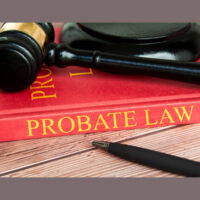Do Retirement Accounts, IRAs, And Life Insurance Policies Go Through Probate?

Many of your assets can, and will, go through probate. But, what about retirement accounts, IRAs, and life insurance policies?
Going over whether or not retirement accounts, IRAs, and life insurance policies go through probate, while speaking with a lawyer, will allow you to protect your estate.
Do Retirement Accounts, IRAs, And Life Insurance Policies Go Through Probate?
The answer to the question outlined above is usually “No.” And, the reason for this is as follows: all of these accounts are designed to have named beneficiaries.
If you have named a beneficiary, then these accounts will not go through probate. They will, instead, go directly to the beneficiary you have named, allowing them to make use of the assets you have given them.
On the other hand, though, if you never named a beneficiary, then your retirement accounts, IRA, and life insurance policy will go through probate. This will allow the accounts to be assessed and, then, a beneficiary to be chosen.
The beneficiary your retirement accounts, IRA, and life insurance policy will go to is dependent on the will. And, this will be determined as a result of the probate process or, alternatively, by the named beneficiary on the account.
How Can You Prevent Your Accounts From Going Through Probate?
The best way to prevent your accounts from going through probate is to name a beneficiary for each and every one of your accounts.
Just as an example, if you have a life insurance policy, then you can name your daughter as the beneficiary of this particular policy.
Or, just as another example, if you have a retirement account and an IRA, you can name that same daughter as the beneficiary for both of those accounts.
If you name a beneficiary for those accounts then, when the time comes, they will go to the beneficiaries you have named. But, if they do not have a named beneficiary, they will be forced to go through probate.
Outside of the above, there is another estate planning tool you can work with, to prevent your accounts from going through probate. This tool encompasses far more than just your accounts and is great for assets of all sorts.
How Can You Bypass Probate Entirely?
The best way to bypass probate entirely is to develop a trust that allows your estate, and the assets it contains, to bypass every facet of the probate process.
Just as an example, you can develop an irrevocable living trust. By doing so, the assets within the trust will be set up for your beneficiaries and, when the time comes, those assets will be distributed to them very quickly.
A wide variety of other trusts allow you to bypass probate entirely. But, an irrevocable living trust is one of the very best and, in developing this trust, you bypass probate as well as any claims that creditors might make.
If your estate goes through the probate process, it will take quite some time before your beneficiaries can receive your assets. And, on top of that, your estate will need to pay the probate fees, as well as any unpaid bills.
Speak With A Florida Probate Lawyer Today
If you would like to protect your estate from the probate process, it is of the utmost importance that you work with a professional.
Speak with a Florida probate lawyer at the Millhorn Elder Law Planning Group today and we will help you protect your estate from the fees, complications, and delays created by the probate process.
Sources:
law.cornell.edu/wex/probate
law.cornell.edu/wex/trust
